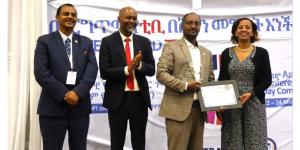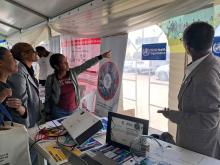Ethiopia Commemorates World Tuberculosis Day with Renewed Resolve: Ministry Applauds WHO's Contribution
Addis Ababa, March 24, 2024
Ethiopia commemorated World Tuberculosis Day (WTD) with renewed resolve, hosting a series of events, including a TB Research Conference held in the capital, Addis Ababa, from March 22nd to 23rd, 2024, to raise awareness about the global fight against Tuberculosis (TB).
Speaking at the annual Tuberculosis Research Advisory Council (TRAC) opening ceremony, the newly appointed Minister of Health, H.E. Dr. Mekdes Daba, expressed profound appreciation for the support provided by WHO, USAID, and other partners. She underlined these organizations' integral role in the fight against TB.
During the event, the Minister praised the World Health Organization (WHO) 's vital role in developing evidence-based policy options and supporting countries in implementing strategies to combat the disease. She presented awards to acknowledge WHO’s role and contributions.
The Minister committed to ending the TB epidemic through strengthening collaboration with development partners and bilateral & international organizations, adapting and implementing the latest global recommendations, and enhancing the multisectoral and multistakeholder response to tuberculosis.
Speaking during the WTD commemoration event, which was also graced by senior officials from the Ministry of Health, WHO-Ethiopia, and partner organizations, the Ministry of Health's Disease Prevention and Control Lead Executive Officer (LEO), Dr. Hiwot Solomon, emphasized the urgent need to combat this preventable and treatable disease at national, regional, and global levels.
Dr. Patrick Abok, representing WHO Ethiopia, highlighted WHO's pivotal role in supporting Ethiopia's National TB, Leprosy, and Other Lung Diseases Programs through various initiatives. These initiatives include coordinating multisectoral responses, providing technical assistance, strengthening TB laboratories, promoting evidence generation for policy change, and addressing data quality issues through implementing digital case-based surveillance for TB.
Regarding the coordination of multisectoral response and partnership strengthening, WHO Ethiopia has supported the adaptation and national launch of guideline on multisectoral response for TB, ensuring the engagement of multiple stakeholders, including the private sector, civil society organizations, and partners. WHO has also provided technical assistance support in revising the national TB, Leprosy, and Other Lung Diseases Strategic Plan, comprehensive TB guidelines, and TB laboratory manuals.
Furthermore, WHO built national capacity for programmatic and clinical management of tuberculosis by sponsoring various international workshops/conferences, organizing in-country trainings on costing and budgeting of the TB strategic plan, and conducting a preliminary mission to assess the country's efforts for the NTRL to be one of the CoE( Centre of Excellence) in the African region. WHO Ethiopia is also aiding in transitioning to digital case-based surveillance to ensure real-time, accurate data for decision-making, addressing a significant challenge in the TB program.
In his speech, Dr. Abok emphasized that the health system alone cannot achieve progress in combating TB and its drivers. Ending TB requires firm political commitment at the highest level, strong multisectoral collaboration beyond health, and an effective accountability system. Individuals, communities, health professionals, academics, researchers, civil societies, and others all have a role to play, he added.
TB remains the deadliest infectious disease worldwide, claiming an estimated 11 million lives annually, with 1.1 million succumbing to the illness. In Africa, TB stands as the second leading cause of death from a single infectious agent, surpassing the toll of HIV/AIDS. According to the latest report from the World Health Organization's African Regional Office (WHO-AFRO), approximately 2.5 million individuals contracted TB in the region in 2022, equating to one person every 13 seconds.
Globally, 30 high TB burden countries account for about 87% of new TB cases, with Ethiopia among them grappling with a high burden of TB cases. This underscores the importance of concerted efforts in the fight against the epidemic.
TB predominantly affects settings plagued by poverty and other social and economic challenges, as well as vulnerable populations. Poverty, undernourishment, and poor living and working conditions, among other factors, contribute to the incidence of TB and affect individuals' ability to cope with the disease and its treatment.
World TB Day, observed annually on March 24, serves as an occasion to raise awareness and understanding about TB and its devastating health, social, and economic impacts.
This year's theme for World TB Day is "Yes! We can end TB!" The theme aims to inspire hope and encourage high-level leadership, increased investments, faster uptake of new tools and strategies, and multisectoral collaboration to combat the TB epidemic.
On World TB Day, the World Health Organization (WHO) urged everyone to uphold the promise to accelerate the End TB response to reach the targets outlined in the WHO End TB Strategy, Sustainable Development Goals (SDGs), and the political declaration of the UN High-Level Meeting on TB.

